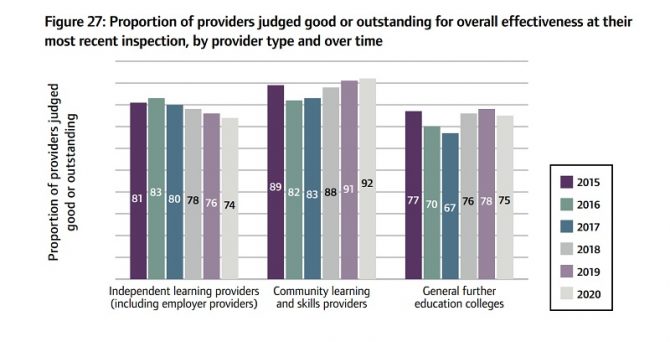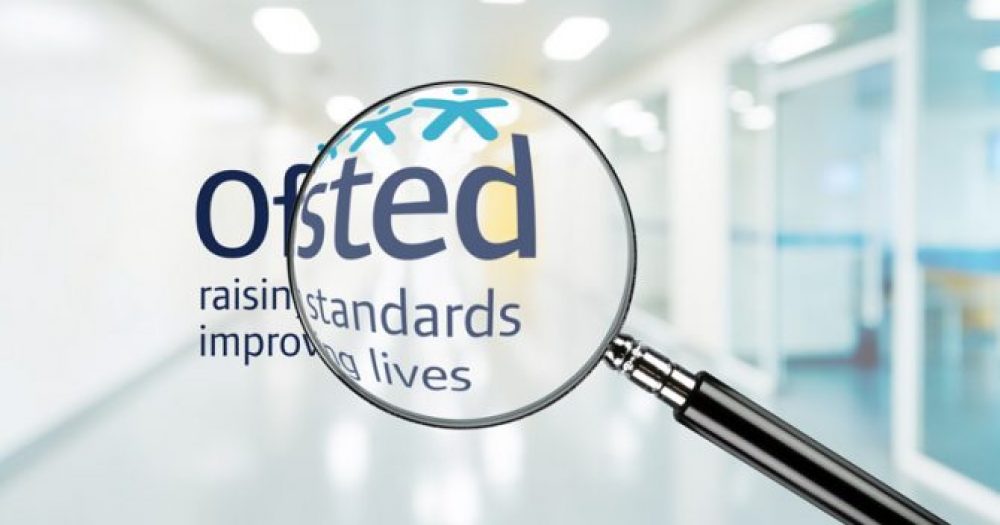Apprenticeships are the “weakest” area of provision in FE providers, with one in ten judged ‘inadequate’ last year, Ofsted has said.
In its annual stocktake of education, the inspectorate reported that of the 120 inspections to include an apprenticeships grade in 2019/20, 3 per cent achieved ‘outstanding’, 50 per cent were ‘good’, and 38 per cent were ‘requires improvement’.
A total of 10 per cent were ‘inadequate’, which the report says is “clearly too large a number”.
The figures come 18 months after Ofsted’s chief inspector Amanda Spielman told FE Week’s Annual Apprenticeship Conference that the quality of apprenticeships was “sticking” and urged the sector to “improve”.
Meanwhile, today’s report also warns of declining quality in independent learning providers with the proportion judged ‘good’ or ‘outstanding’ falling for the fourth consecutive year – dropping from a high of 83 per cent in 2016 to 74 per cent in 2020.
However, it should be noted that Ofsted has included employer providers in with the data for private providers.
In 2019/20, the watchdog said it saw in some independent providers that governance was “not in place or was not sufficiently challenging in holding senior leaders to account to identify the aspects of the provision that needed to be improved”.
“We also saw leaders, managers and the governance function not moving swiftly enough to implement the recommendations made at a new provider monitoring visit,” the report added.
“Independent learning providers did not focus enough on working closely with employers to develop a meaningful and well-thought-out curriculum to meet the training requirements of apprentices and employers.”
Nearly a quarter (24 per cent) of providers that received new provider monitoring visits this year had at least one insufficient progress judgement.
Ofsted said that in “many cases”, this was down to “weak leadership and a lack of co-development of the curriculum with employers”.
Association of Employment and Learning Providers managing director Jane Hickie told FE Week that the pressures on private providers have been “enormous”.
“Even before the pandemic struck, the Commons education committee warned that good quality apprenticeships can’t be delivered on the cheap and while the [Ofsted] report doesn’t cover the first lockdown period when inspections stopped, the lack of provider relief for levy apprenticeships and the crash in starts have added to the scale of the challenges even though the minister and others have recognised what a fantastic job providers did in keeping so many programmes going remotely,” she said.
“We hope that the current review of funding rates by IfATE leads to a realistic outcome of recognising the costs involved in delivering a good apprenticeship programme.”
In comparison to private providers, community learning providers have seen the proportion judged ‘good’ or ‘outstanding’ increase for the fourth year and sat at 92 per cent in 2020, while colleges have seen their proportion shift downwards from 78 per cent last year to 75 per cent.

During an Ofsted press conference on the annual report, Christopher Russell, acting national director for education, said that the inspectorate will be “focussing sharply” on apprenticeships quality over the coming months.
“We have some concern over quality in some cases. Of our new provider monitoring visits over the year, in a quarter we found progress to be insufficient and that does give us a worry.
“We will continue to look very closely within those visits and follow-up, what the quality is/ Quite often we are finding that the leadership isn’t sharp enough, that the curriculum isn’t well thought out enough.
“And when we return we are finding sometimes that the actions that we have pointed out that are needed haven’t been taken quickly enough. This is a weaker area, apprenticeships, and we will be focussing sharply therefore on that as we do our work over the coming months.”
A Department for Education spokesperson said: “We are pleased the vast majority of apprenticeships providers have continued to deliver high quality training. However, we recognise that there is more work to do to make sure that every apprentice can access the best possible training.
“We will continue to work with employers and training providers, and with the Institute and the Quality Alliance to help boost apprenticeship quality and make sure more people get the skills they need to get ahead.”
Click here to read FE Week’s speed read of Ofsted’s 2019/20 annual report.









I guess a headline of “independent providers achieve 74% and colleges achieve 75%” isn’t quite as exciting as “‘inadequate’ apprenticeships as private provider grades fall for 4th year” with all of the implications thereof.
Given the amount of (ESFA encouraged) new entry into the industry a 10% or so drop in quality rates over a few years is not a very surprising outcome.
I suspect that if you were to compare experienced providers with 5 or 10 years experience then the % would be much higher perhaps?
Move focus on learners is needed,not spread sheets and data because the true value of a great learning experience cannot be expressed as simply as numbers on a spread sheet we deal with different levels of learning on a daily basis